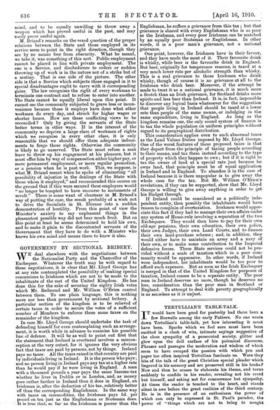GOVERNMENT BY SECTIONAL BRIBERY.
WE deal elsewhere with the negotiations between the Nationalist Party and the Chancellor of the Exchequer. Whatever the truth may be with regard to these negotiations, it is clear that Mr. Lloyd George has at any rate contemplated the possibility of making special concessions to Irishmen which are not to be made to the inhabitants of the rest of the United Kingdom. He has done this for the sake of securing the eighty Irish votes which Mr. Redmond and Mr. William O'Brien control between them. To use plain language, this is nothing more nor less than government by sectional bribery. A particular section of the kingdom is to be relieved of certain taxes in order to secure the votes of a sufficient number of Members to enforce these same taxes on the remainder of the kingdom.
In case Mr. Lloyd George should undertake the task of defending himself for even contemplating such an arrange- ment, it is worth while in advance to examine his possible line of defence. It will be as well to point out first that the statement that Ireland is overtaxed involves a miscon- ception at the very outset, for it ignores the very obvious fact that taxes are paid by persons, not by things. Ireland pays no taxes. All the taxes raised in that country are paid by individuals living in Ireland. It is the person who pays ; and no person living in Ireland pays any tax at a higher rate than he would nay if he were living in England. A man with a thousand pounds a year pays the same Income-tax whether he lives in Dublin or in London, and, as money goes rather farther in Ireland than it does in England, an Irishman is, after the deduction of his tax, relatively better off than the corresponding Englishman. In the same way with taxes on commodities, the Irishman pays M. per pound on tea just as the Englishman or Scotsman does. ' it is true that; so far as the Irishman is poorer than the Englishman, he suffers a grievance from this tax ; but that grievance is shared with every Englishman who is as poor as the Irishman, and every poor Irishman can be matched by an equally poor Scotsman or Englishman.. In other words, it is a poor man's grievance, not a national grievance.
One point, however, the Irishmen have in their favour, and they have made the most of it. Their favourite drink is whisky, while beer is the favourite drink in England. But beer, originally for temperance reasons, is taxed at a very much lower rate per alcoholic strength than whisky. This is a real grievance to those Irishmen who drink whisky, though of course it is no grievance at all to the Irishmen who drink beer. Moreover, if the attempt be made to treat it as a national grievance, it is much more a Scotch than an Irish grievance, for Scotland drinks more spirits and less beer than Ireland. It is, in fact, impossible to discover any logical basis whatsoever for the suggestion that people living in Ireland should be taxed at a lower rate than people of the same means, or indulging in the same expenditure, living in England. As long as the kingdom remains one, the only sound system of finance is to tax the whole population on uniform principles without regard to its geographical distribution. This consideration applies even to such abnormal taxes as the Land Values Duties imposed by Mr. Lloyd George. One of the worst features of these proposed taxes is that they depart from the principle of taxing people according to their means, and tax them instead according to the type of property which they happen to own ; but if it is right to tax the owner of land at a special rate just because he owns land, that principle must be of equal application in Ireland and in England. To abandon it in the case of Ireland because it is there unpopular is to give away the whole case for the tax. But Mr. William O'Brien's revelations, if they can be supported, show that Mr. Lloyd George is willing to give away anything in order to get his Budget through. If Ireland could be considered as a politically inde- pendent entity, then possibly the inhabitants would have reason to complain of overtaxation. Irishmen would appre- ciate this fact if they had to manage their own affairs under any system of Home-rule involving a separation of the two Exchequers. They would then have to pay for their own old-age pensions, their own education, their own police, their own Judges, their own Land Courts, and to finance their own land-purchase scheme ; and, in addition, they would either have to maintain an army and a navy of their own, or to make some contribution to the Imperial defensive forces. These State services could not be pro- vided without a scale of taxation which in a poor com- munity would be oppressive. In other words, if Ireland were independent, her inhabitants would be too poor to afford such expenses. But as soon as the Irish Exchequer is merged in that of the United Kingdom for purposes of taxation, Ireland ceases to be a separate entity. The poor man in Ireland deserves no more, though he deserves no less, consideration than the poor man in Scotland or England. To attempt to deal with poverty geographically is as senseless as it is unjust.














































 Previous page
Previous page